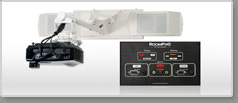Teachers urged to save voice with a microphone
By Adam Sage in Paris
Teachers are being advised to use microphones, loudspeakers and other techniques to save their vocal cords.
A team of scientists issued the recommendations after a study of the impact of increasingly noisy classrooms. The survey of 3,904 teachers in France discovered that they were twice as likely as other workers to suffer disorders ranging from sore throats to vocal fold swelling.
A quarter of the men and half the women interviewed said that they often or always suffered vocal problems. Scientists said that women teachers were at greater risk because those with high voices were more likely to put a strain on their vocal cords.
According to the French National Institute of Health and Medical Research (Inserm), the consequences were grave as teachers struggled to make themselves heard above the babble. "It can rebound on the professional and social life of the person concerned, affecting their mental, physical and emotional state and their ability to communicate."
Teachers were urged to consider using a portable microphone linked to loud speakers. Not only was this "very efficient", but judiciously placed speakers avoided the trouble of an "intensity gradient", or poor sound in in the back row. Remedies could also involve vocal courses for trainee teachers, to learn breathing exercises, stress control and a diet to counter voice disorders. Large quantities of water were advisable, but dairy products, spices, chocolate and tomatoes are not.
Classroom acoustics could also be revised, with teachers told to raise themselves rather than their voices. "Simple tricks such as standing on a stage, furnishing the room with bookshelves and curtains and equipping the feet of tables and chairs with rubber can suffice," the report said.
A study in the US found that teachers took an average of two days of sick leave a year because of vocal disorders, with healthcare and replacements costing $638 million (£315 million). Inserm said that "acoustic pollution" had been compounded by interactive lessons, where children were invited to communicate and not just to listen. It added that classroom behaviour had changed, with "pupils who chatter more and more noisily". A vicious circle follows, with teachers suffering stress as they worry that they will become inaudible, and stress leading to voice loss, the researchers said.
"Someone who does not feel they are being heard gets taut, leans forwards and strains the tone of the voice," said Professor Antoine Giovanni, head of the Laboratory of Clinical Audio-Phonology in Marseilles.
In Britain, Sue Kirkham, head of Walton High School in Stafford, did not like the idea of microphones. "It would be useful for teachers to be taught how better to use their voices," ahe said. "In a classroom with fewer than 30 students, a microphone seems an unnecessary use of technology. Research has found that children respond to quieter voices."









